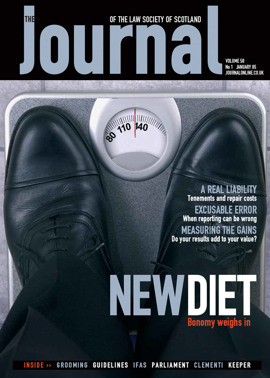Book reviews
EDITORS: GEORGE FAREBROTHER AND NICHOLAS KOLLERSTROM
PUBLISHER: SPOKESMAN, FOR INSTITUTE FOR LAW AND PEACE AND THE LEGAL INQUIRY STEERING GROUP
ISBN: 0 85124 692 3
PRICE: £10
The materials constituting this text are those prepared with the intent of calling the UK Government to account in respect of its support of the US and the intervention in Iraq. The “people power” efforts were expressed in a number of events leading to the exposition of the legal arguments in different fora. These events are reflected in chronological order in the book and the documents produced are contained in separate parts.
On 11 October 2002 The Citizen Legal Inquiry into the Legality of Use of Force against Iraq was held at Gray’s Inn. This was chaired by Professor Colin Warbrick of Durham University and submissions presented in support of the Government’s proposed (as it was then) action were made by Julian Knowles of Matrix Chambers, with Rabinder Singh his Chambers colleague, together with Janet Kentridge, making the counter arguments. The Gray’s Inn inquiry was largely responsible for a BBC “Today” programme as to whether Britain’s involvement in any war against Iraq without further specific UN endorsement would be legal under international law. The case against was presented by
Professor Nicholas Grief, University of Bournemouth, whereas the legality of such involvement was presented by Anthony Aust, Deputy Director of the British Institute of International and Comparative Law and former FCO Depute Legal Adviser. Professor Vaughan Lowe, Fellow of All Souls College Oxford, acted as adjudicator.
The text also includes the materials surrounding the Campaign for Nuclear Disarmament’s legal challenge to the Government and the response of the High Court to the request for a judicial review as to whether Resolution 1441 authorised military action in the event of the non-compliance of Iraq with its terms. The court declined jurisdiction on the grounds that English courts would not rule on the interpretation of international instruments that only applied at the international law level. Also included in the text are further opinions issued subsequent to the outbreak of the hostilities, including the legality of the presence of UK armed forces in Iraq. The Government’s position on the legality of the hostilities, presented by the Attorney-General to Parliament on 17 March 2003, is reproduced. The first appendix consists of two letters authored by public interest lawyers and addressed to both the Prime Minister and the Defence Secretary, outlining the case for having possibly committed war crimes as defined in international law. The text of UN Security Council Resolutions 678, 687 and 1441 is reproduced in Appendix II.
The content of the text is broader than the title at first sight might suggest. Notwithstanding the conclusions of both Professor Warbrick and Professor Lowe that the proposed intervention was unlawful under international law, the arguments for and against are fully examined. The arguments are based in law, devoid of political rhetoric. The analysis is executed within the framework of international law and conclusions as to the legitimacy of the intervention of force are presented only after rigorous legal analysis. However it should be noted that the book primarily focuses on the UK’s position vis-à-vis the use of force and contains only the actions taken by those organisations involved in the Legal Inquiry Steering Group.
The publication of this text highlights the progress of the campaign from the social discourse to the legal analysis. As such the text constitutes the core of this process but may also one day be a useful tool in further judicial inquiries that may be initiated. As it stands the book represents a very valuable teaching tool as the materials may be employed in a number of disciplines, e.g. law and politics. However the text will also be of interest to anyone seeking an informed exposition and analysis of the respective positions within the legal framework of international law.
Rebecca M M Wallace, Professor of International Human Rights Law, The Robert Gordon University, Aberdeen; Olga Martin Ortega, PhD candidate, University of Jaen, Spain
In this issue
- Riding the wave of change
- Last stand for the defence
- Losing the wait
- What right to be wrong?
- Prevention as the cure
- No room for half measures
- Poles apart
- Get IT right
- The value proposition
- A time for resolution
- When it falls, it falls
- Round the houses
- Private bills and public interest
- Charging Peter to pay Paul
- Fair pay for liquidators
- Website reviews
- Book reviews
- Fair notice?
- The new title conditions






